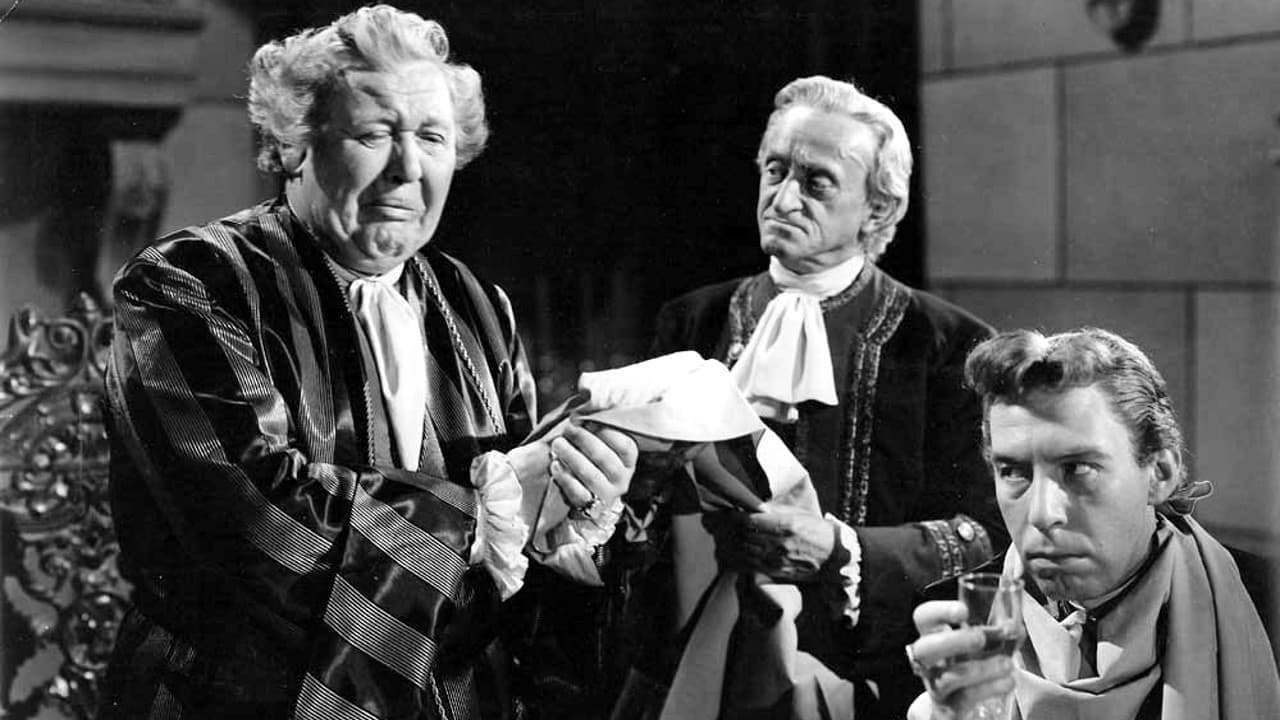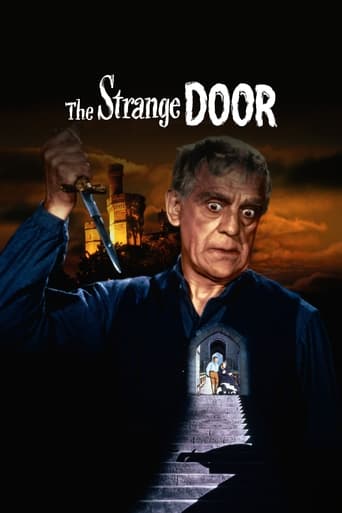

We all know Charles Laughton can play someone likable, and we all know he can play a bad guy-but in The Strange Door he plays both! He's a man driven insane by jealousy and a broken heart, but he's not dark and brooding. He cracks jokes, giggles, and treats everything with a light touch that doesn't overlap into mugging or milking. In the midst of this very dark, creepy story, I found myself laughing every time he was on the screen!Charles lives in a creepy, mysterious house with his niece, Sally Forrest. He arranges for her to marry Richard Wyler, but the pair isn't very willing. Charles is very insistent that his plans get carried out, so he enlists his faithful servant Boris Karloff to help. Poor Boris! Throughout the movie, his only motivation is to be helpful, but he's ordered around by so many different people he gets confused. Despite Charles's humor and Boris's sweetness, this movie isn't really very good. It's not one I'd want to watch over and over again, but if you like old, campy, scary movies, you can rent it.
... View MoreEntertaining Gothic thriller from Universal starring Charles Laughton as a sadistic nobleman who takes a young ne'er-do-well prisoner and plans to marry him off to his niece as a means of punishing her. Boris Karloff also appears but it's a part that's frankly beneath him at this stage of his career. Chaney and Lugosi I understand playing parts like this because of how their demons had wrecked their careers. But Karloff kept his nose clean and deserved better. Anyway, Charles Laughton is the reason to watch as he has a grand time playing to the rafters. The story is okay with some decent twists and turns, but it's really only worth a look for the healthy doses of ham from Laughton.
... View MoreIt's rather ironic that "The Strange Door" was included in the fabulous Boris Karloff collection (horror fans, buy this!!), since his role in the story albeit important is rather limited in screen time. If some distributor ever comes up with the luminous idea of releasing a Charles Laughton box set, then this film most definitely should be a part of that, as it is mainly he who steals the show! Karloff is professional and reliable as always, but it's Laughton who dominates every sequence he's in; hands down. "The Strange Door" is adapted from a story by Robert Louis Stevenson (the creator of "Dr. Jekyll and Mr. Hyde") and it's a truly engaging and atmospheric tale set during the Victorian era in France. Laughton portrays Sire Alain de Maledroit, a malicious nobleman who hates every still living member of his family and wants to destroy them slow & painfully. Therefore he personally selects a reputed troublemaker to marry his niece Blanche and counts on the possibility that he'll emotionally wreck her! And even though Blanche believes that her father is long dead, Sire de Maledroit keeps him locked up in the dungeons beneath the castle. Boris Karloff plays Voltan, the only servant that remained loyal to count Edmond. The story isn't always very plausible and contains quite a few immense holes. I'm sure there are easier ways for Sire de Maledroit to torture his relatives than to rely on the bad attitude of an outsider? Or how is it possible that, for twenty whole years, Blanche doesn't even suspect that her father is kept prisoner in the castle while everybody else knows? Yet, despite these and several other improbabilities, "the Strange Door" is an entertaining Gothic horror film with superb decors, a fair amount of tension and poetic dialogs. The last sequences are particularly exciting, as the castle turns out to be a labyrinth filled with eerie death traps and dark corridors. It's nice to see Karloff star in a heroic role for a change. Recommended!
... View More"The Strange Door" was based on the Robert Louis Stevenson story "The Sire de Maldroit's Door". The film appears to have been an effort by Universal to revive its profitable Gothic horror genre of the 30s and 40s. Unfortunately, the film has the look of a "B" movie and Director Josph Pevney was unable to rein in star Charles Laughton's hammy performance.Alan de Maledroit (Laughton) lures unsuspecting tavern rogue Denis de Beaulieu (Richard Stapely) to his castle after framing for a murder. de Beaulieu enters the castle through the strange door of the title, a door that seems to open and close on its own without benefit of a handle or lock.de Maledroit plans to force the young man to marry his young niece Blanche (Sally Forrest) and by selecting the most reprehensible character he could find, hopes to avenge her mother's rejection of him years earlier. Blanche's mother had died in child birth after marrying her father Edward, Alan's brother. Edward (Paul Cavanaugh) unbeknown st to Blanche, has been imprisoned in Alan's dungeon these many years. Only Edward's loyal servant Voltan (Boris Karloff) remains loyal to him.As luck would have it, the young couple do actually fall in love. The marriage takes place but Denis feigns drunkenly in order to escape the castle with the aid of an old acquaintance Count Grasson (Alan Napier). However, Grasson is murdered and the newly weds are imprisoned in the same dungeon as Edward. Only Voltan stands between the mad de Maletroit and freedom. Can they escape?Had Laughton's performance been controlled by a stronger director, this could have been a much better film. Karloff as usual, is better than his material in a largely supporting role. I can picture him in the de Maledroit role and bringing much more depth and horror to the role. The set pieces evoke memories of Universal's earlier horror successes. The strange door of the title has little to do with the plot other than to trap de Beaulieu in the castle.Others in the cast include William Cottrell as Corbeau, de Maledroit's assistant and Michael Pate as Talon another of de Maledroit's thugs. Laughton and Karloff had first appeared together in "The Old Dark House (1932). Followed by "The Black Castle" (1952) before the studio abandoned Gothic horror for the giant insect cycle.
... View More